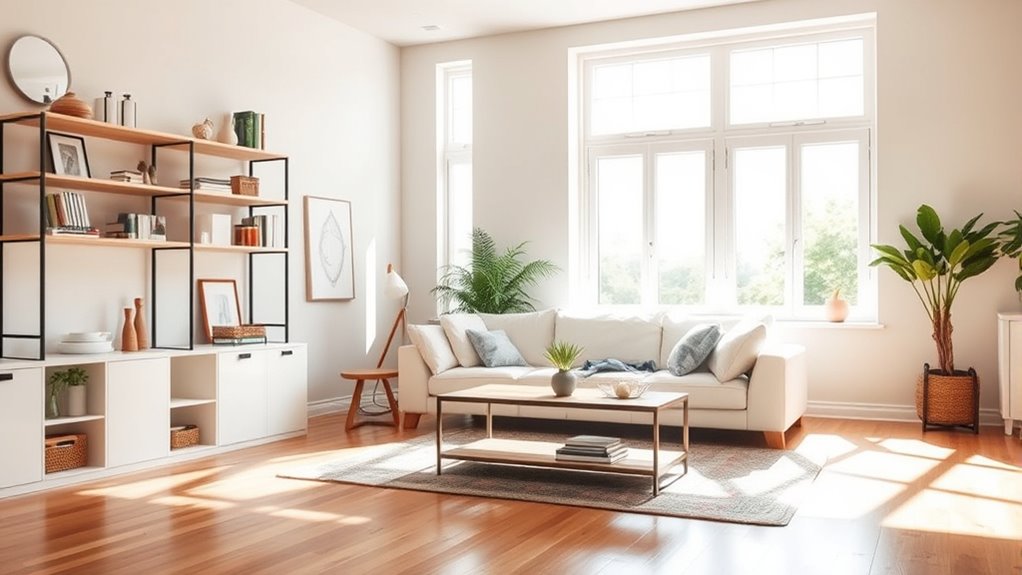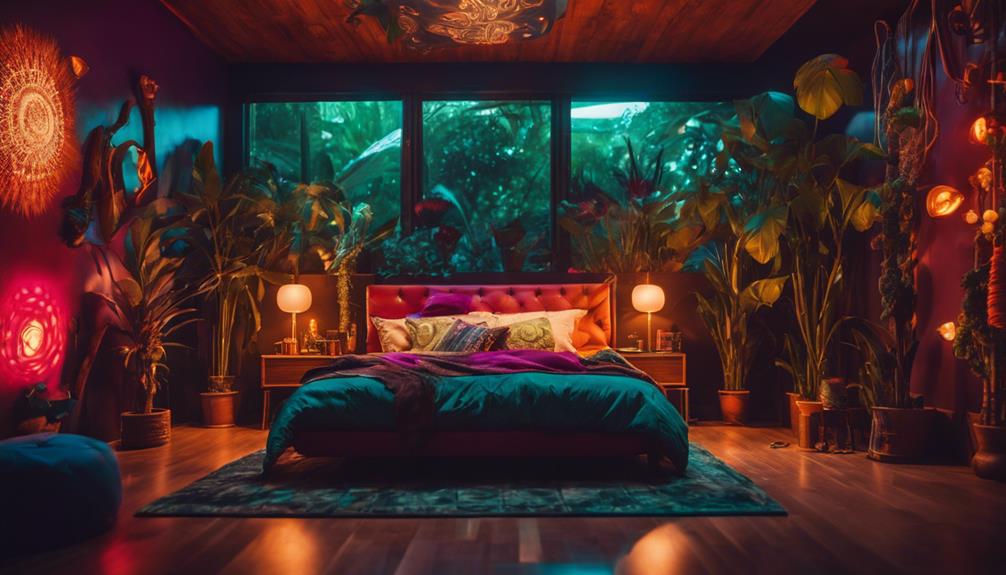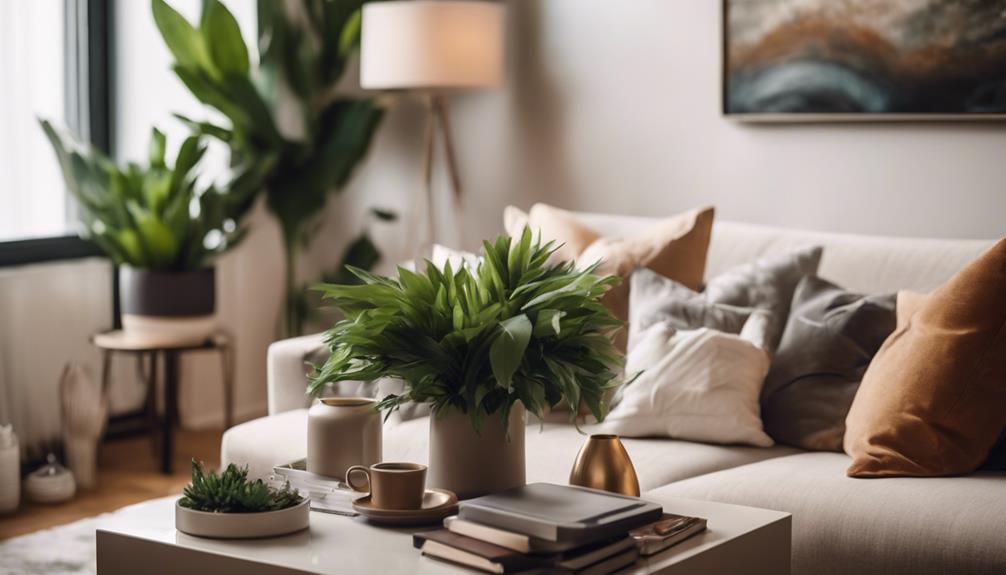Decluttering your home can boost your mental clarity by reducing feelings of overwhelm and stress. Start by creating designated storage spaces and using smart solutions like multifunctional furniture to keep things organized. Practice regular routines to maintain tidiness and adopt minimalist principles—keeping only what truly adds value or joy. Clear surfaces and calm colors help promote relaxation. Keep going to uncover more practical tips that can help you create a peaceful, clutter-free space for better focus and serenity.
Key Takeaways
- Implement smart storage solutions to keep belongings organized and reduce visual clutter.
- Establish regular decluttering routines to prevent accumulation of unnecessary items.
- Designate specific storage areas to maintain a tidy and functional living space.
- Adopt minimalist principles by keeping only items that add value or joy.
- Use calming aesthetic choices like neutral colors and simple decor to create a tranquil environment.

A cluttered home can feel overwhelming and stressful, but the good news is that decluttering is within your control. When your space is chaotic, your mind often follows suit, making it hard to focus, relax, or feel productive. Tackling clutter isn’t just about tidying up; it’s about creating an environment that supports your mental well-being. One effective way to do this is by exploring smart storage solutions. Invest in furniture that doubles as storage, such as ottomans, beds with drawers, or wall-mounted shelves. These pieces help you keep belongings organized and out of sight, reducing visual noise. Clear, designated storage areas also make it easier to maintain a tidy space over time, so clutter doesn’t accumulate again. Additionally, adopting clutter-free principles can help you develop habits that prevent clutter from building up in the first place.
Adopting minimalist design principles can further enhance your efforts. Minimalism isn’t about stripping your home of everything but about intentionally choosing only what adds value or joy. When you pare down your possessions, you create a space that feels open and calming, rather than cramped and chaotic. Start by evaluating each item—ask yourself if it truly serves a purpose or brings you happiness. If it doesn’t, consider donating, recycling, or discarding it. This process not only reduces clutter but also helps you develop a mindful relationship with your belongings.
Incorporating minimalist design also involves choosing simple, clean lines and neutral colors that promote tranquility. Avoid cluttered surfaces and excessive decorations, which can distract your mind and make your space feel busier than it is. Instead, opt for a few meaningful pieces that complement the overall aesthetic. Keep surfaces clear, and use storage solutions to hide away things you need but don’t want on display. With fewer distractions, your space becomes more inviting and easier to maintain, giving you a mental boost every time you step inside.
Frequently Asked Questions
How Often Should I Declutter to Maintain Mental Clarity?
You should declutter every few months to maintain mental clarity through effective decluttering routines. Regularly tidying up helps prevent clutter buildup, reducing stress and enhancing your mental health benefits. Keep an eye on your space and set reminders to declutter, ensuring your environment stays organized and calming. Consistent decluttering routines make it easier to enjoy a clear mind and a more peaceful home, supporting your overall well-being.
What Are the Best Tools for Effective Decluttering?
Think of your decluttering tools as a toolbox; the right ones make the job easier. Use storage solutions like bins and shelves to keep things organized, and try simple organization techniques such as categorizing items. I once found that labeled containers made my space look like a well-oiled machine, saving time and reducing stress. These tools help you stay consistent and keep your environment clear, boosting mental clarity.
How Can I Stay Motivated to Declutter Regularly?
To stay motivated to declutter regularly, focus on maintaining a positive decluttering mindset. Use motivational techniques like setting small, achievable goals and rewarding yourself for progress. Remind yourself of the mental clarity benefits and how a tidy space reduces stress. Keep a visual of your ideal organized home, and track your progress. These strategies will help you stay committed and make decluttering a rewarding, ongoing habit.
Should I Donate or Sell Items I No Longer Need?
You should consider donating or selling items you no longer need, as donation benefits often support charitable causes and create a sense of giving back. Research shows donating can boost your mood and mental clarity. If you prefer quick results, selling tips like pricing items competitively and using online platforms can help you declutter efficiently. Both options clear space and provide a rewarding way to manage your possessions.
How Do I Handle Sentimental Clutter Without Feeling Overwhelmed?
You handle sentimental clutter by focusing on emotional attachment and memory preservation. Take your time, and don’t rush the process. Select a few meaningful items that truly represent your memories, and find creative ways to display or store them. Consider taking photos of items you’re letting go of, so you preserve the memory without keeping the physical object. This approach helps you declutter without feeling overwhelmed or losing important sentimental value.
Conclusion
Decluttering your home isn’t just about tidiness—it’s about boosting your mental clarity. Studies show that a cluttered space can increase stress levels by 40%, making it harder to focus. When you clear your environment, you create a calm, organized space that nurtures your mind. So, take a step today; your mental well-being will thank you. A tidy home isn’t just visually pleasing—it’s a powerful tool for a clearer, more focused you.









